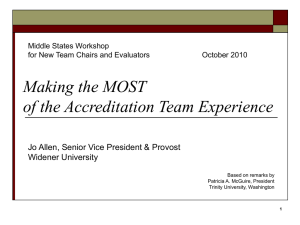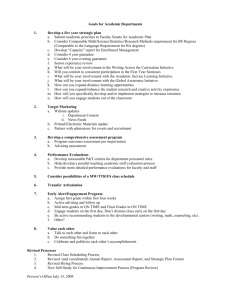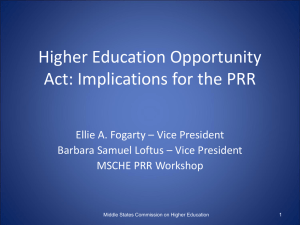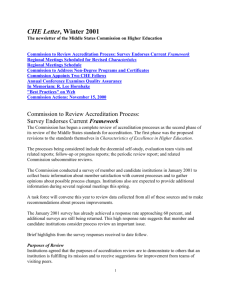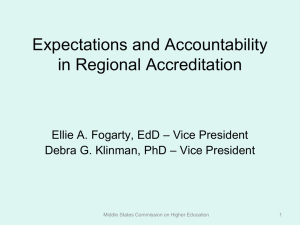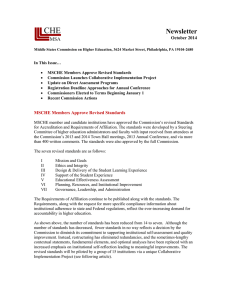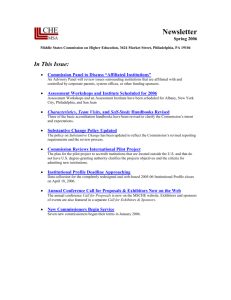CHE Letter, Winter 2002 - Middle States Commission on Higher
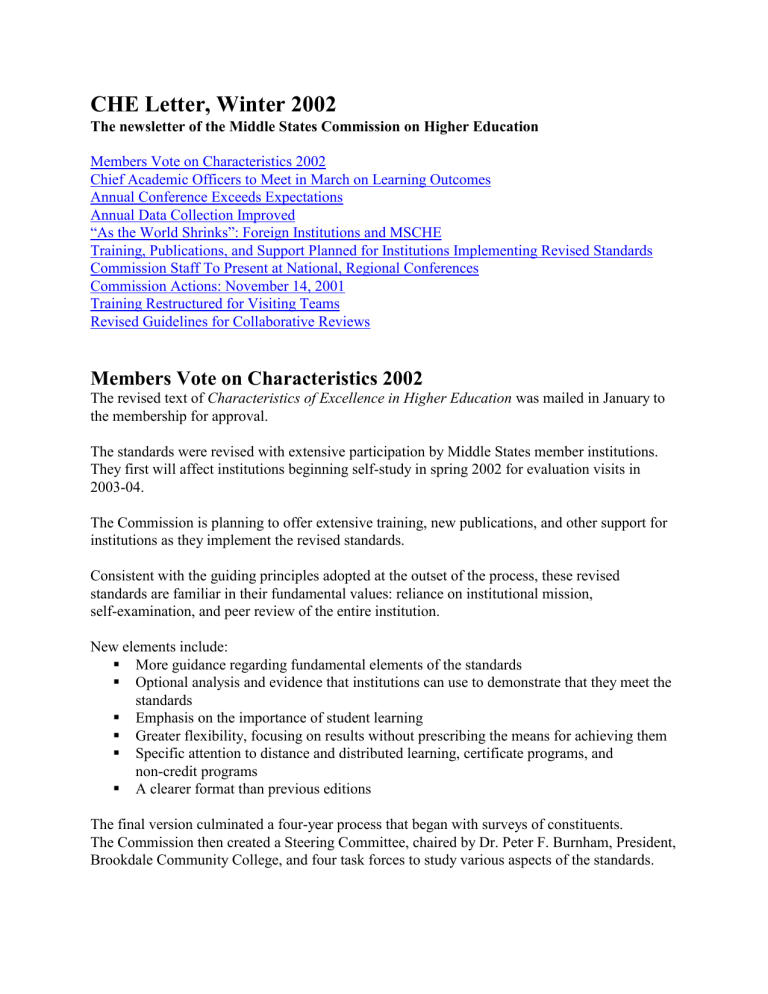
CHE Letter, Winter 2002
The newsletter of the Middle States Commission on Higher Education
Members Vote on Characteristics 2002
Chief Academic Officers to Meet in March on Learning Outcomes
Annual Conference Exceeds Expectations
Annual Data Collection Improved
“As the World Shrinks”: Foreign Institutions and MSCHE
Training, Publications, and Support Planned for Institutions Implementing Revised Standards
Commission Staff To Present at National, Regional Conferences
Commission Actions: November 14, 2001
Training Restructured for Visiting Teams
Revised Guidelines for Collaborative Reviews
Members Vote on Characteristics 2002
The revised text of Characteristics of Excellence in Higher Education was mailed in January to the membership for approval.
The standards were revised with extensive participation by Middle States member institutions.
They first will affect institutions beginning self-study in spring 2002 for evaluation visits in
2003-04.
The Commission is planning to offer extensive training, new publications, and other support for institutions as they implement the revised standards.
Consistent with the guiding principles adopted at the outset of the process, these revised standards are familiar in their fundamental values: reliance on institutional mission, self-examination, and peer review of the entire institution.
New elements include:
More guidance regarding fundamental elements of the standards
Optional analysis and evidence that institutions can use to demonstrate that they meet the standards
Emphasis on the importance of student learning
Greater flexibility, focusing on results without prescribing the means for achieving them
Specific attention to distance and distributed learning, certificate programs, and non-credit programs
A clearer format than previous editions
The final version culminated a four-year process that began with surveys of constituents.
The Commission then created a Steering Committee, chaired by Dr. Peter F. Burnham, President,
Brookdale Community College, and four task forces to study various aspects of the standards.
After several initial drafts, comments from constituents, 10 regional meetings of more than 500 representatives from 270 accredited institutions, and sessions at two annual conferences, the
Commission amended and approved the text of Characteristics in November 2001.
Membership approval will be based on a majority of the institutions responding to the ballot. The document will be published in February.
Annual Conference Exceeds Expectations
More than 850 people, representing 303 member and candidate institutions, attended the
Commission = s annual conference, held on the Inner Harbor, Baltimore, in December 2001.
Dr. Peter T. Ewell, Vice President, National Center for Higher Education Management Systems, opened the conference. Dr. Alexander W. Astin, Director, Higher Education Research Institute,
University of California, Los Angeles, closed the event. Commission Chair, Dr. William B.
DeLauder, reported on the state of the region in a luncheon address which was seen by live video in two overflow rooms.
Most of the topics in breakout sessions related to learning outcomes and assessment, including creating a culture of assessment, accountability for institutional effectiveness, creating learning- centered institutions, designing an assessment program, critical thinking, developing learning outcomes, multiple agency requirements for assessment, planning and budgeting, diverse learning styles, and putting assessment results to good use.
Additional sessions were held on such topics as trustees and institutional governance, technology in teaching and learning, ensuring quality on the extended campus, distance learning, and new accreditation processes for Characteristics 2002.
A surge in registrations in the weeks just before the conference reflected the institutions = interest in the special program that focused on student learning. The last-minute registrations, coupled with late scheduling of construction projects in the Hyatt Regency Hotel = s largest meeting rooms, filled to capacity the replacement venue in the Sheraton Inner Harbor Hotel across the street. As a result, one-half of the sessions were rescheduled again to meeting rooms at the Hyatt, where most AQA guests were staying.
The Commission regrets any inconvenience to attendees and is making plans to ensure adequate facilities for the 2002 annual conference in Washington, DC.
Chief Academic Officers to Meet in March on Learning Outcomes
Chief academic officers from colleges and universities in the Middle States region will attend a conference in Philadelphia on March 21 B 22 to discuss implementing the revised standards in
Characteristics 2002.
The conference will help them lead their institutions to develop and enhance statements of learning outcomes, integrate them coherently across the curriculum, assess them, and use the resulting information for improvement. They will consider how best to lead their faculty and administrative staff in developing or revising their campus assessment plans.
In breakout groups, participants will work on specific assessment plans for their institutions.
They will reconsider their institutions = mission statements, selected outcomes statements, and related assessment strategies.
Dr. Richard J. Light, Harvard University, author of Making the Most of College: Students Speak
Their Minds , will open the conference.
Other speakers include:
Dr. Trudy Banta, Indiana University-Purdue University Indianapolis
Dr. R. Eugene Rice, American Association for Higher Education
Dr. Kenneth R. Smith, The University of Arizona
Ms. Patricia McGuire, President, Trinity College, and Former MSCHE Commissioner.
A panel will discuss successes and challenges from the field. It will be moderated by Dr. Judith
Gay, Vice President for Academic Affairs, Community College of Philadelphia, and MSCHE
Vice Chair.
Other panelists include: Dr. David L. Carr, Vice President for Academic Affairs, The Richard
Stockton College of New Jersey; Dr. Carol S. Fixman, Vice President for Academic Affairs and
Dean of the Faculty, Philadelphia University; Dr. Johanna H. Kobran, Vice President for
Educational Services, Brookdale Community College.
For more information and to register online, visit the Commission = s website at http://www.msache.org/symp.html
.
Annual Data Collection Improved
A new and easier Institutional Profile (formerly the AIP or Annual Institutional Profile) previewed online from January 7-18, 2002. The actual data collection period opens from January
21 to February 28.
Information on the Profile is used for many purposes. Some portions are provided to the public through the Commission = s directory of members and candidates on the web. Some information is included in the A Statement of Accreditation Status @ for each institution which the public may request. Visiting teams use the entire Profile.
After the data are analyzed by Commission staff, they are shared with members and the public and are used to improve Commission policies and practices. The Profile also is used to calculate each institution = s annual dues.
New this year, each institution will be able to declare its own type, based on the 2000 Carnegie
Classification System, instead of the modified-Carnegie types that the Commission has used for many years.
To make it easier to update the Profile, last year = s data will be provided in parallel format for reference in the graduation and enrollment sections. Other major improvements include ease in filling out the form, improved online access, and formatted printing. For example, there is a more attractive screen format this year. Users also will be able to preview and print formatted copies of the Profile.
The Institutional Profile is delivered by A thin client @ technology, allowing the user to experience the familiar Microsoft Windows interface, instead of the HTML-based browser interface used last year. Before accessing the Profile, users will download the A thin client @ program that allows access to the Internet-based application, without using sometimes- incompatible web browsers.
This year, the Commission is hosting the Profile on a dedicated server to provide a greater capacity for simultaneous access. However, even a dedicated server has limits. Users are asked to exit the program properly at the end of each session.
Institutions may access the site with the same passwords issued last year. However, if an institution = s A key user @ has changed, please notify Mr. Joe at tjoe@msache.org
or call
215-662-5606, Extension 28. Replacement passwords will be mailed to the president = s office for secure distribution.
A
As the World Shrinks
@
: Foreign Institutions and MSCHE
The Middle States Commission on Higher Education has encouraged the exploration of different types of initiatives to promote international quality assurance.
As both global population and the amount of knowledge increase, the number of institutions throughout the world offering higher education has grown in recent years. At the same time, the international exchange of students and employees also has increased.
These trends place new burdens on our Middle States institutions and their students, as they struggle to determine the quality of the education offered by non-U.S. institutions.
For many years, Middle States has accredited A U.S. style @ institutions that are chartered in the
Middle States region and located abroad. It also has reviewed foreign branches of member institutions.
Now, the Commission is exploring the possibility of also reviewing foreign institutions, particularly when the interests of Middle States member institutions are involved. For example, foreign institutions may partner with U.S. institutions, or they may provide education to U.S. students.
In addition, the Executive Director, Ms. Jean Avnet Morse, serves on an international task force sponsored by the International Association of University Presidents and by the International
Network for Quality Assurance Agencies in Higher Education (INQAAHE), with participation by UNESCO and others.
The task force is working towards forming an international organization to certify the quality of the quality assurance agencies in each country C rather than the institutions or programs they review C so that information is available about whether the local quality assurance organization is itself reputable. This approach has the advantages of avoiding both duplication of review activities and possible issues of A cultural imperialism.
@
Also, the eight U.S. regional accrediting commissions will discuss the possibility of coordinated
U.S. review of foreign institutions.
All of these projects are in exploratory stages, and the Commission welcomes suggestions from the readers of this newsletter. Please send comments to Jean Morse at jmorse@msache.org
.
Training, Publications, and Support Planned for Institutions
Implementing Revised Standards
The Commission is supporting the efforts of institutions that are implementing the revised standards in Characteristics 2002 by offering training workshops and conferences, publications, and other staff assistance.
These activities began in November 2001 when representatives of the 50 institutions in the first cohort using the revised standards attended The Self-Study Institute in Philadelphia. Participants discussed the impact that the standards will have on their institutions = self-study process and their subsequent evaluation visit.
A special conference for chief academic officers will be held on March 21-22 to help them better lead their campuses in implementing the requirements for developing learning outcomes statements, assessment, and improvement.
A new handbook on the assessment of student learning will be published in the spring. It was developed by the Advisory Panel on Student Learning and Assessment, chaired by Dr. Peter Gray of Syracuse University.
The handbook will be a resource for faculty, staff, and administrators who lead assessment activities on campus, develop assessment tools, or design assessment plans. It will contain sample materials, measures, and references, and it will be supplemented with regularly updated resources on the MSCHE website.
Training sessions for institutions entering self-study, for evaluators, and for team chairs are being redesigned to reflect the new accreditation standards.
Finally, the Task Force on Accreditation processes is considering whether any revised or new accreditation processes and procedures may be needed. The Task Force offered its preliminary proposals during two sessions at the 2001 annual conference.
These changes included a new selected topics approach that allows an institution to concentrate attention on selected issues in its self-study report. Information relevant to other standards would be reviewed separately, before the team visit, and not be included in the self-study. Other suggestions included the use of evaluation team commendations, and categories of follow-up reports indicating different levels of concern. Final proposals will be sent to member institutions for comment later this spring.
Of course, institutions also can rely on the Middle States staff liaison that is assigned to them for continued support through consultation.
Commission Staff To Present at National, Regional Conferences
As part of a broad effort to publicize the revised accreditation standards and other new initiatives,
Commission staff will make presentations at several conferences.
One will be a workshop and a separate reception at the 2002 Assessment Conference of the
American Association for Higher Education, which will be held in Boston on June 19 B 23.
The workshop will introduce the revised Middle States standards for accreditation and the new handbook on student learning assessment. Presenters at the workshop will include Ms. Jean
Avnet Morse, MSCHE Executive Director; Dr. Peter J. Gray of Syracuse University and Chair of the MSCHE Advisory Panel on Student Learning and Assessment; and Ms. Linda Suskie,
Towson University and MSCHE Advisory Panel member.
The Commission invites conferees from institutions in the Middle States region to attend the reception and meet each other, the workshop presenters, and several Commission staff.
Commission staff also are planning presentations on the revised standards and the student learning guidelines to the following organizations:
NCTLA Penn State Assessment Conference in San Juan (February)
Council of Independent Colleges and Universities Annual Meeting (March)
Association of Specialized and Professional Accreditors (April)
SUNY Academic Affairs Officers Conference (June)
National Institute on the Assessment of Experiential Learning, sponsored by Thomas
Edison State College and CAEL (June)
Association of College and Research Libraries Best Practices Project (June)
Council on Undergraduate Research (June)
Commission Actions
November 14, 2001
A Statement of Accreditation Status @ is available for each institution listed below. Submit requests in writing to the Executive Director, Middle States Commission on Higher Education, 3624 Market Street, Philadelphia,
PA 19104. The following list also appears on the Commission = s website ( http://www.msache.org/special.html
) within 30 days of the Commission action.
Request to Apply for Candidacy Granted
[5 Institutions]
American University of Sharjah, United Arab Emirates
Athabasca University, Canada
Institute of World Politics, DC
International University in Geneva, Switzerland
Pennsylvania School of Art and Design, PA
Candidate for Accreditation Status Granted
[3 Institutions]
Electronic Data Processing College of Puerto Rico, PR
Potomac College, DC
Tai Sophia Institute, MD
Candidate for Accreditation Status Reaffirmed
[1 Institution]
The Center for Advanced Manufacturing and Technology, PA
Accreditation Reaffirmed via Evaluation Visit
[2 Institutions]
Cornell University, NY
University of Puerto Rico - Carolina, PR
Accreditation Reaffirmed via Periodic Review Report
[55 Institutions]
Albright College, PA
Atlantic Cape Community College, NJ
Bergen Community College, NJ
Butler County Community Colege, PA
Carlow College, PA
Cayuga County Community College, NY
Cheyney University of Pennsylvania, PA
City University of New York - Kingsborough Community College, NY
Columbia University, NY
Concordia College, NY
Conservatory of Music of Puerto Rico, PR
Daemen College, NY
Fairleigh Dickinson University, NJ
Five Towns College, NY
Frederick Community College, MD
Frostburg State University, MD
Fulton-Montgomery Community College, NY
Goldey-Beacom College, DE
Gwynedd-Mercy College, PA
Hilbert College, NY
Indiana University of Pennsylvania, PA
Jewish Theological Seminary of America, NY
LaSalle University, PA
LeMoyne College, NY
Marywood Univerity, PA
Monmouth University, NJ
Monroe Community College, NY
Muhlenberg College, PA
Nazareth College of Rochester, NY
Neumann College, PA
Niagara County Community College, NY
Pennsylvania Institute of Technology, PA
Philadelphia University, PA
Rensselaer Polytechnic, NY
Richmond, The American International University in London, England
Rider University, NJ
Roberts Wesleyan College, NY
Saint Francis University, PA
Saint John Fisher College, NY
St. John
= s University, NY
Salisbury University, MD
Skidmore College, NY
Sojourner-Douglas College, MD
State University of New York - Downstate Medical Center, NY
Teachers College of Columbia University, NY
Trinity College, DC
Ulster County Community College, NY
United States Naval Academy, MD
University of Maryland, Baltimore, MD
University of Maryland, Baltimore County, MD
University of Maryland Eastern Shore, MD
University of Maryland University College, MD
University of Puerto Rico - Mayaguez, PR
Widener University, PA
York College of Pennsylvania, PA
Substantive Change
[17 Institutions]
[Note: The policy on substantive change is available on the web at .]
Cayuga County Community College, NY
Centenary College, NJ
Delaware Technical and Community College - Jack F. Owens Campus
Delaware Technical and Community College - Stanton/Wilmington Campus
Delaware Technical and Community College - Terry Campus
DeSales University, PA
Keuka College, NY
La Roche College, PA
Lehigh Carbon Community College, NY
Mount Saint Mary = s College, MD
Nyack College, NY
Pontifical Catholic University of Puerto Rico - Arecibo, PR
State University of New York - College at Brockport, NY
State University of New York - College at Oswego, NY
Strayer University, DC
Union College, NY
Universidad Politecnica de Puerto Rico, PR
Warning Issued
[1 Issued]
Unification Theological Seminary, NY
Follow-up Reports/ Candidate Reports/Visits/ Developments
[35 Institutions]
[(*) Reference to these institutions appears more than once in the Summary of Actions. Reports and/or visits were required prior to CHE action.]
Albany College of Pharmacy of Union University, NY
Allegheny College, PA
*American University of Sharjah, United Arab Emirates
Arcadia University, PA
*Athabasca University, Canada
Berkeley College, NY
Boricua College, NY
*The Center for Advanced Manufacturing and Technology, PA
College Misericordia, PA
*Electronic Data Processing College of Puerto Rico, PR
Erie Community College, NY
Georgian Court College, NJ
Hood College, MD
ICPR Junior College, PR
*Institute of World Politics, DC
*International University in Geneva, Switzerland
Molloy College, NY
Montclair State University, NJ
Montgomery County Community College, PA
National Labor College, MD
Neumann College, PA
New Jersey City University, NJ
New York Institute of Technology, NY
*Pennsylvania School of Art and Design, PA
*Potomac College, DC
Practical Bible College, NY
Rosemont College, PA
State University of New York - College of Technology at Alfred, NY
Seton Hall University, NJ
Strayer University, DC
*Tai Sophia Institute, MD
*Unification Theological Seminary, NY
University College of Criminal Justice of Puerto Rico, PR
University of the District of Columbia, DC
Valley Forge Military College, PA
Training Restructured for Visiting Teams
The 2001 invitational workshop for 22 chairs and 91 evaluators assigned to visiting teams was held at the Sheraton Inner Harbor Hotel in Baltimore on Sunday, December 2.
For the first time in recent years, the training was held as a pre-conference event for the annual
Accreditation and Quality Assurance Conference. It also combined what traditionally have been separate workshops for team chairs and for evaluators.
Plenary speakers offered information useful to both groups. The speakers included Ms. Barbara
Boyington, Professor of Business, Brookdale Community College, speaking on campus preparation for self-study. MSCHE Deputy Executive Director Dr. John H. Erickson described the Commission = s expectations for self-study, evaluation, and outcomes assessment, and
Executive Associate Director Dr. Robin Dasher-Alston discussed off-campus sites, distance learning, and other alternative offerings.
Separate breakout sessions followed for chairs and evaluators preparing to visit five different types of institutions: liberal arts, public comprehensive, private comprehensive, community colleges, and specialized institutions.
Dr. Margaret Mary Fitzpatrick, President, St. Thomas Aquinas College, spoke to chairs about the chair = s preparation, the preliminary visit, the team visit, the evaluation team report, the chair = s brief, and Commission action.
Each breakout session for the evaluators was led by an experienced chair who led participants through a mock team visit and evaluation, based on one of five different self-study reports that had been sent to attendees in advance. They discussed the evaluator = s approach in reviewing a self-study report, as well as an analysis of the assigned self-study report and the team = s findings.
These facilitators included Dr. Timothy R. Thyreen, President, Waynesburg College; Dr.
Anthony F. Ceddia, President, Shippensburg University of Pennsylvania; Dr. Dorothy Brown,
Provost, Georgetown University; Dr. William Connor, Former President, Sussex Community
College; and Dr. Donald E. Simon, Academic Dean, Monroe College.
The workshop in 2002 will be held in Philadelphia in September, rather than as a pre-conference event for AQA 2002. First-time chairs and evaluators who will be assigned to teams in academic year 2002-03 will be invited to attend the workshop.
Revised Guidelines for Collaborative Reviews
A new publication, Guidelines for Collaborative Reviews , will be published in early spring 2002.
A collaborative review is a cooperative process, conducted jointly by institutional and specialized accrediting organizations, state or federal agencies, and other organizations.
The review is conducted at the invitation of an accredited institution. The reviewing organizations that the institutions invite may choose whether to participate.
Historically, joint evaluations have been part of the fabric at Middle States as early as 1961.
These joint efforts were limited in scope and in the number of accreditation agencies included.
Guidelines for true collaborative reviews were first developed in 1997 by a national task force
that included members of three institutional accrediting commissions, four specialized accrediting agencies, and the chief executive officers of the Council for Higher Education
Accreditation (CHEA) and the Association of Specialized and Professional Accreditors.
During the last four years, Middle States was involved in a pilot project to test these guidelines.
It included 21 institutional reviews, involving two-year, specialized, liberal arts, comprehensive, and doctoral-granting institutions.
As a result of the pilot, surveys, interviews, informal assessment and feedback, and comments from presidents and others following these visits, the guidelines have been improved and expanded.
The new guidelines outline processes to facilitate A collaborative reviews @ among the institutional, specialized, and professional accreditors that the institution selects. In addition, the guidelines have been broadened to include cooperation with government agencies and collaboration with organizations other than accreditors, such as those that promote excellence and offer special recognition for excellence.
